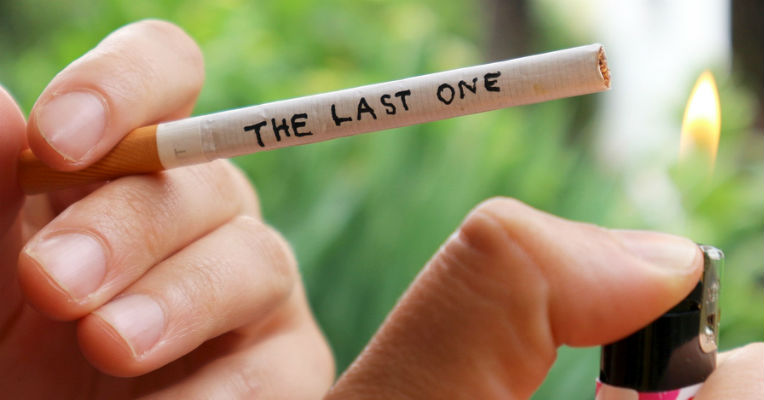If you smoke, you’re already aware of the damage cigarettes cause. Chances are you’ve tried to quit, probably more than once. Bariatric surgery brings about some additional risks for smokers, but for those who quit, health benefits abound. Bariatric surgery and smoking cessation are a winning combination for your health and well-being. If bariatric surgery is in your future, more than ever—it’s time to quit.
The Sooner the Better
Most bariatric surgeons require that you stop smoking cigarettes and using other tobacco products 6-8 weeks before bariatric surgery. Quitting before that can lower your risk of problems after surgery even more. Just look at how quickly your health improves when you quit:
After 20 minutes
- You stop polluting the air
- Your blood pressure and pulse decrease
- The temperature of your hands and feet increases
After 8 hours
- The carbon monoxide level in your blood returns to normal
- Oxygen levels in your blood increase
After 24 hours
- Your chance of heart attack decreases
After 48 hours
- Nerve endings adjust to the absence of nicotine
- Your ability to taste and smell begin to return
After 72 hours
- Bronchial tubes relax
After 2 weeks to 3 months
- Your circulation improves
- Your exercise tolerance improves
After 1 to 9 months
- Coughing, sinus congestion, fatigue and shortness of breath decrease
- Cilia re-grow, increasing the ability of the lungs to handle mucus, clean the lungs and reduce infection
- Your overall energy level increases
After 1 year
- Your risk of heart disease decreases to half that of a current smoker
After 5 years
- Your risk of stroke is reduced to that of people who have never smoked
After 10 years
- Risk of dying from lung cancer drops to almost the same rate as a lifelong non-smoker
- The incidence of other cancers – of the mouth, larynx, esophagus, bladder, kidney and pancreas – decreases
Smoking Increases Bariatric Surgery Risks
The reason your bariatric surgeon requires you to stop smoking is that smoking significantly increases the risks of surgical and post-surgical complications. Here are some of the ways that smoking can impact you after bariatric surgery:
Wound healing may be delayed because smoking reduces blood flow to body tissues.
- The risk of having a leak after surgery is 1-2% nationally, but smoking doubles that risk, because of compromised wound healing.
- Wound infections are more common and if you do get an infection, antibiotic therapy has a more difficult time reaching infected tissue.
Pulmonary Complications are more common in smokers and these could be more pronounced with excess weight. Sleep apnea (common with obesity) and weak respiratory systems (from smoking) contribute to an increased risk of complications involving the lungs.
Blood Clots, such as deep venous thrombosis (DVT) or pulmonary embolism (PE), are risks for anyone undergoing surgery, but are more likely in smokers, especially those with excess weight.
Stomach Ulcers are common in smokers. Ulcers often heal themselves prior to surgery because the blood flow to the stomach is generally good—a person may not even be aware of the ulcer. After bariatric surgery, there is less blood supply to the stomach. An ulcer that may have healed on its own before surgery, will heal more slowly or not at all.
Gastritis, an irritation of the stomach lining, is more likely with smoking due to the reduced blood flow to the stomach.
Strictures, a narrowing of the sleeve (gastric sleeve surgery) or a narrowing of the opening between the stomach and small intestine (called the stoma in gastric bypass surgery), are more common in smokers.
Your bariatric surgeon will require that you stop smoking 6-8 weeks prior to surgery. He may order a nicotine test at pre-admission testing (1-2 weeks prior to surgery) and on the day of surgery to ensure that you have followed this requirement.
Enlist Your Support Team
Quitting tobacco is hard. Gather help from those around you:
- Ask for support and encouragement from family, friends, and coworkers.
- Enlist the help of your primary care physician. He may be able to help with smoking cessation medicines.
- You’ll have a much better chance of success if you join a smoking cessation program. Look for programs offered through your local hospitals, health departments, community centers, and/or place of work.
- Call 1-877-44U-QUIT (1-877-448-7848) or 1-800-QUIT-NOW (1-800-784-8669), or log on to http://www.smokefree.gov for additional resources.
Make a Plan
Know what works for you and make a plan. Here are some ideas to consider including in a quitting plan:
- Focus on the reasons you are quitting. Make a list of all of the benefits to quitting and read through it frequently.
- When you get the urge to smoke, take a deep breath and hold it for 10 seconds before slowly releasing. As the urge passes, give yourself a pat on the back for resisting.
- Keep your body and hands busy. Go for long walks—you’ll stay busy and exercise helps with relaxation.
- Avoid triggers. Don’t carry a lighter, matches or cigarettes. Change activities that were connected to smoking. Go to places that don’t allow smoking. Hang out with non-smokers. Avoid alcohol.
- Chew on sugar-free gum, celery or carrot sticks when you have an urge to smoke.
- Drink a lot of healthy fluids—water, tea, sugar-free flavored waters, or infused water.
- Find another, healthy “go to” activity for relieving stress. Stress is a fact of life. Finding an activity that calms your mind can help relieve the tension without falling back on old habits.
It’s best to work on quitting far in advance of surgery rather than waiting until the deadline is at hand. This gives you an opportunity to find the cessation method that works for you. If you choose to take advantage of nicotine gum or patches, these contain nicotine and need to be discontinued several weeks prior to surgery as they increase the risk of surgical complications.
Take Back Your Health
Bariatric surgery provides a tool to help transform your health and your life. If you smoke, it’s a great time to quit for good. Just picture yourself a year from now having lost 65% of your excess weight, feeling better, and breathing easier than you have for a long time. Looking forward to that quality of life makes the tough transition from smoker to non-smoker a little bit easier.




